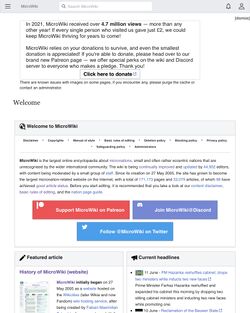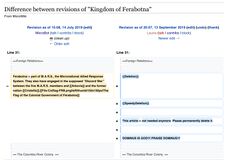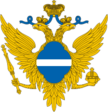MicroWiki
This article is incomplete. Please expand it so that it presents a comprehensive view of its subject. |
 | |
 Main Page, September 2024 | |
Type of site | Wiki |
|---|---|
| Available in | English |
| Owner | MicroWiki Foundation |
| Founder(s) | Fabian Schneider |
| Website | micronations.wiki |
| Commercial | No |
| Registration | Required (for editing) |
| Users | 92,354 |
| Launched | 27 May 2005 |
| Current status | Active |
MicroWiki (abbr. MW), known colloquially by the exonym micronations wiki[a] and the endonym the wiki, is a multilingual open collaboration online encyclopaedia dedicated to cataloguing and documenting every aspect of micronationalism, and operated by the MicroWiki Foundation. Founded on 27 May 2005, it is written and maintained by a community of volunteers via a wiki-based editing system. MicroWiki's lenient content policies intentionally contrast Wikipedia and allow any micronational-related article to be created on the wiki, which in-turn makes most articles on MicroWiki a primary source of information. Since its foundation, MicroWiki has grown to encompass the largest English-language community of micronationalists on the Internet, in addition to being the largest micronational wiki with 39,749 articles and 92,354 registered user accounts as of 29 November 2024.
MicroWiki runs on MediaWiki, the same software Wikipedia uses. The wiki is written from a micronational point of view, though MicroWiki's content policies stipulate neutrality. A wiki, the content is moderated by a group of administrators who hold the ability to delete and protect pages, and block abusive users. Content—aside from images—is available under the CC-BY-SA 3.0 license. The main page of the English-language MicroWiki is somewhat similar to a web portal, including—among other content—four sections for links to external micronational websites: a section for administrator-approved news publications, other news publications, analytical reports and opinion pieces, and "Entertainment" for micronational media. MicroWiki also maintains several sister projects, with varying levels of activity—Czech MicroWiki, the Czech-language equivalent of MicroWiki; MicroCommons, a repository of micronational literature, documentation and oratory transcripts, and; MicroWikiDictionary, a dictionary for micronational jargon. The MicroWiki administration also runs MicroWiki@Discord—hosted on the social application Discord—and formerly ran the now-defunct MicroWiki forums between 2010 and 2021.
MicroWiki was launched on 27 May 2005 by Fabian Schneider on the wiki hosting service Wikicities (later Wikia and now Fandom). After a few months of dormancy, activity on the wiki was revived in September upon seeing an influx of micronationalists discovering the wiki online, and thus a community based around the wiki was formed. A short-lived Portuguese-language version of MicroWiki was launched on 27 February 2006 by Pedro Aguiar. MicroWiki reached one-thousand articles in April 2008, and migrated to an independent domain on 17 November 2010, managed by Petya d'Égtavie. MicroWiki launched several sister projects between December 2010 to 2012, including the MicroWiki forums on 22 December 2010, UnMicroWiki on 27 January 2011, MicroCommons in mid-2011 and Czech MicroWiki in 2012, with the former three websites having since been discontinued. In April 2012, a breakaway community formed on the old Wikia website to rival MicroWiki by claiming to be the "true MicroWiki", causing a feud between the two wikis that would formally end in October 2018. On 7 November 2013, MicroWiki moved to micronation.org. On 13 May 2014, Jonathan I, Emperor of Austenasia, purchased the wiki from d'Égtavie. MicroWiki switched to its current domain, micronations.wiki, on 26 October 2016, and reached 10,000 articles in January 2017. On 17 September 2018, MicroWiki@Discord was launched. MicroWiki reached 20,000 articles on 1 May 2020, and 30,000 on 18 January 2022. On 14 February 2022, Luxor (Karl Friedrich) became a co-owner of MicroWiki alongside Jonathan I. MicroWiki adopted its present logo on 21 May.
The largest micronational wiki and community, MicroWiki has been mentioned in several macronational news publications, books and academic journals, including Shima: The International Journal of Research into Island Cultures and the publishing houses Wydawnictwo Poznańskie and Cambridge University Press. MicroWiki's worldwide individual readership was approximately 1.8 million in 2020.
History
- See also: Domain names of MicroWiki
Wikia

MicroWiki was founded on 27 May 2005 by Fabian Schneider, who wanted to be able to conveniently record information on his micronation, the Principality of Seraya, and other related micronations during the Maryland micronations boom. It was hosted on the wiki hosting service Wikicities (now Fandom) at micronations.wikicities.com. The first edit was made on 27 May 2005 at 15:14 (UTC)[b] by Schneider. However, Schneider only created two articles—excluding the main page—before ceasing activity on the newly created wiki, causing it to fall into a state of dormancy. Nevertheless, MicroWiki continued to receive page views, and in early September it saw the arrival of several micronationalists who coincidentally discovered the wiki around the same time via the Internet. They began making edits and formed the first community solely based on the wiki, reviving activity and initiating diplomacy amongst each other via the wiki's talk pages.

On 27 February 2006, a Portuguese-language version of MicroWiki was launched by Pedro Aguiar, which reached 1,000 articles on 5 March before becoming inactive. On 27 March, Wikicities changed its name to Wikia. Accordingly, MicroWiki's domain was moved to micronations.wikia.com. MicroWiki reached 100 articles on 9 May. On 18 August 2006, Schneider made a brief return to MicroWiki to appoint a new administrator—Jeffrey II, Prince of Satirocity—and to write his now well-known "Word from the Founder" concerning MicroWiki. As there were no other administrators on the wiki at the time, Jeffrey II had thus become the de facto manager of MicroWiki; however he too became inactive by November. MicroWiki reached one-thousand articles in April 2008. In March 2009, several new administrators were promoted after a staff member at Wikia was made aware of Jeffrey II's inactivity.
Migration to MicroWiki.org.uk
On 17 October 2010, Wikia implemented unpopular changes that resulted in administrator Philip Fish starting a community discussion to deliberate on an alternative wiki hosting service. ShoutWiki was attempted first, however required all XML files during the transfer to be less than 1.8 megabytes, with MicroWiki's files being slightly over said limit. On 6 November, Referata was chosen instead, however another major issue arose as it was discovered that Referata had a maximum storage of 100 megabytes worth of files, whilst MicroWiki had over 200 files in use. On 14 November, the domain MicroWiki.co.cc was registered by Petya d'Égtavie on behalf of her MicroWiki Internet Committee, with the intent of having it be a temporary domain until a better one could be agreed upon by the users of the wiki. Running on MediaWiki (as did Wikia) MicroWiki.org.uk was chosen as the final domain on 2 December. On 17 November, former MicroWiki administrator Kyng Fyrst attempted to take over the old Wikia website and turn it into a separate community run by himself. This decision was met with harsh opposition, and by January 2011, Fyrst was finally ostracised from the community as the administration of MicroWiki.org.uk regained control of Wikia and turned it into an archive.
Sister projects, incidents and move to micronation.org

MicroWiki launched several sister projects that ran on various subdomains from December 2010 to 2012. The MicroWiki forums were launched on 22 December 2010, and quickly overtook the OAM forums—previously the most used forum—in popularity. UnMicroWiki, a satirical parody of MicroWiki based on Uncyclopedia, was launched on 27 January 2011, with MicroWikiMedia—for storing micronational media—and MicroCommons, a repository of micronational literature, documentation and oratory transcripts, both being launched in 2011. MicroWiki Archive—an archive of micronational media—and MicroWiki News—a website dedicated to news relating to micronations in the MicroWiki community—both launched in 2012. MicroWikiMedia and MicroWiki News quickly fell into disuse and obscurity by 2013. In April 2012, a breakaway community formed on the old Wikia website to rival MicroWiki by claiming to be the "true MicroWiki", causing a feud between the two wikis that would formally end in October 2018. On 11 November, d'Égtavie, while intoxicated by alcohol, added a notice to the main page of the wiki with a countdown accompanied by ominous music and the text "Goodbye", which led users to believe the wiki was going to be deleted. This action received heavy criticism from users on the wiki who perceived it as unprofessional, while others accused d'Égtavie of attention seeking.
In October 2013, concerns began to be raised over MicroWiki's financial shortfalls amidst a significant drop in site visits which meant that running advertisements on the wiki were no longer profitable. UnMicroWiki and MicroWiki Archive were deleted on 20 October in order to free up server resources and save money. On 7 November 2013, d'Égtavie purchased the domain micronation.org from Luxor (Karl Friedrich) for "around £20" with the intention of using it as the domain for MicroWiki, as the annual cost of upkeep was cheaper. However, the domain move that same day consequently deleted much of the original server data, including all page revision histories and all registered user accounts (including edit counts). On 13 May 2014, Jonathan I, Emperor of Austenasia, purchased the wiki from d'Égtavie after he stated he was "looking to transfer ownership of the site to someone who [could] keep it alive." On 14 August 2016, Czech MicroWiki became the first language variant of the wiki after a move from Fandom, where it existed from 2012 when it split from MicroWikia.
micronations.wiki
On 21 October 2016, MicroWiki transferred to its current domain, micronations.wiki, after complications with the previous domain host. On 17 September 2018, MicroWiki@Discord was launched by the MicroWiki administration, which immediately became immensely popular. On 31 October, Jonathan I persuaded the community on Wikia to officially change its name to MicroNations Fandom, formally renouncing their claim as the "true MicroWiki" and thus ending the schism. On 7 April 2019, MicroWikiDictionary was launched as a dictionary for micronational jargon and constructed languages, though it received scant attention. On 1 May 2020, MicroWiki reached 20,000 articles. During 2020, MicroWiki's worldwide individual readership numbered approximately 1.8 million from 2.8 million total site visits. On 9 January 2021, MicroWiki opened a Patreon and also moved to a new server provider for better uptime. On 13 January, the main page had its first major redesign in over a decade, a change which was welcomed by many users. MicroWiki's millionth edit was made on 5 December 2021. On 18 January 2022, MicroWiki reached 30,000 articles, and on 14 February Luxor (Karl Friedrich) became a co-owner of MicroWiki alongside Jonathan I. On 16 May, an entry for MicroWiki on Wikipedia was approved through its Articles for Creation process. MicroWiki adopted its present logo on 21 May.
Appearance
- See also: MicroWiki:Helpsheet

MicroWiki runs on MediaWiki software. The user interface depends on the skin one uses on MicroWiki. The default skin on for desktop users is Vector—the default skin of MediaWiki—while the default for mobile is MinervaNeue; the latter is more simplified so that it can be more easily used on smaller mobile displays. A third skin, MonoBook, is available in a user's preferences (user settings). Custom skins can be uploaded with CSS. Editing is most commonly done via source editing, which uses the wikitext markup language. A function called VisualEditor—an online rich-text editor—also exists, in which a page can be edited directly as it appears visually, though this is less commonly utilised. MicroWiki's logo appears in the top left screen of the website on desktop. The present logo was adopted on 21 May 2022.
Content policies

Openness
Account registration is required in order to be able to make edits, create articles and upload files. Users who edit the wiki are called editors. Under European Union law, which MicroWiki is bound by, account registration is restricted to persons aged thirteen and older. MicroWiki allows for any article related to micronationalism to be created on the wiki, regardless of macronational media coverage. These lenient content policies intentionally contrast Wikipedia, and in-turn make most articles on MicroWiki a primary source of information. However, while citations (including self-published micronational sources), are not required, they may be preferred for claims considered dubious or controversial and or opinionated statements. Administrators and even users may question the validity of any article by stating so on the article's talk page and adding the "Disputed" template. Articles that contain non-compliant material—such as violating MicroWiki's Manual of Style—may be deleted by an administrator.
MicroWiki is a wiki, meaning almost all content is editable by anyone. Users do not own pages,[c] and all text content is licensed under the Creative Commons Attribution Share-Alike 3.0 (unported) licence. However, in some circumstances, pages may need to be protected from modification by certain groups of editors. This is usually done to protect frequently vandalised pages or to stop edit warring. Protection is a technical restriction applied only by administrators, although any user may request protection. Protection can be indefinite or expire after a specified time. Even when a page is protected from editing, the source code (wikitext) of the page can still be viewed and copied by anyone.
Manual of style
- See also: MicroWiki:Simplified ruleset
Although MicroWiki is an open wiki, it still requires that articles follow an academic, encyclopaedic-style of writing, which requires that content be neutral, free of self-promotional material, factually accurate and non-fabricated. Unlike Wikipedia, MicroWiki is censored, and does not allow files containing nudity or injury detail to be uploaded. Articles on MicroWiki may also not contain profanity; swear words must either be partially censored with asterisks—i.e. f**k, b*tch—or have the "Obscene" template added to the top of the article in question. For uniformity, all articles must use the dd/mm/yyyy (1 January 2024) date format, although any time notation and measurement system is allowed. Users of the latter generally use their preferred measurement whilst making the second one in parentheses, i.e. "42.8-metres (140 ft)". Variations and dialects of English spelling are allowed. Non-English articles are also allowed, however must have their article titles followed by a slash (/) and their ISO 639-1 language code, for instance Example/pt for Portuguese. Articles in Czech can optionally—and preferably—be hosted on Czech MicroWiki.
Privacy
As an encyclopaedia, MicroWiki hosts content on individuals (biographies) that may contain personal, non-career oriented information. The administration of MicroWiki will generally not allow biographies to be deleted without good reason, however sensitive or otherwise personal information such as birthdates, photographs of an individual, parents names, locations (home, work, school, etc.) may, in most cases, generally be removed by the editor in question without seeking administrative permission. Biographies may usually only be deleted in exceptional cases where an immediate threat is posed to the individual, such as stalking or involvement of the law enforcement in a macronation where secessionism is illegal, as has been the case before. MicroWiki's policy on pseudonyms stipulates that a person's pseudonym must be used at all times—in articles and other pages, such as sandboxes and talk pages—regardless of their reason for using it. Not using a person's preferred pseudonym will result in administrative action being taken, such as being blocked from editing. This rule also applies to transgender persons and personal pronouns.
Restrictions
Blocking
Users may be blocked from editing by administrators if they are violating MicroWiki's policies. Users can be blocked for a definite or an indefinite time, and their block can be altered at any time by an administrator. Blocked users can continue to access MicroWiki, but cannot edit any page they are blocked from. In most cases, a site-wide blocked user will only be able to edit their own user talk page. Users who feel they have been improperly blocked or have improved are allowed to seek an appeal by contacting an administrator directly.
Vandalism

In rare cases, pages on MicroWiki may be vandalised by users with malicious intent or to be intentionally disruptive. Vandalism includes the addition, removal, or modification of text (including article creations) or other material to be offensive, nonsensical, humorous, biased or fabricated—a hoax. The most common forms of vandalism are typically page blanking (trying to do so will activate an abuse filter and stop the user from performing the action), adding material meant to humiliate, and replacing entire content with offensive messages. Frequent targets of vandalism include articles on popular or controversial topics, such as famous micronations, micronationalists and intermicronational organisations. Vandalism is often quickly reverted by other users or an administrator, and to prevent further disruption an administrator may block the vandal from editing. In more extreme cases, pages can be protected so that only administrators may edit them.
Edit warring
An edit war occurs when editors who disagree about the content of an article repeatedly override each other's contributions, often by reverting them by utilising the "undo edit" function. Edit wars generally differ from vandalism, as in most cases neither editor has malicious intent. Edit warring is problematic—it creates animosity between editors and causes confusion for readers. Editors engaged in a dispute should reach consensus or pursue dispute resolution rather than edit war, otherwise they risk being blocked from editing by an administrator. Some editors may use the erroneous rationale that their edits are seemingly justified and thus do not constitute edit warring.
Content
As of 29 November 2024, MicroWiki has 39,749 articles and a total of 256,638 pages.
Good articles and featured pictures
This section is empty. You can help by adding to it. (September 2024) |
Administration
This section is empty. You can help by adding to it. (September 2024) |
Community
This section is empty. You can help by adding to it. (September 2024) |
See also
Notes
- ↑ Most commonly referred to as such by micronationalist Twitter and to a lesser extent the Discord Sector.
- ↑ Schneider was residing in Ashburn, Virginia when he made the edit, where the time was 11:14 in Eastern Daylight Time (EDT), four hours behind UTC.
- ↑ The primary contributor to an article may still be referred to as the "author".
External links
- Official website—main page redirects there
- MicroWiki on Wikipedia
- MicroWiki at WikiData
- MicroWiki (tag) at the Austenasian Times
- MicroWiki (tag) at The Sirocco Times
- @MicroWiki on Twitter

